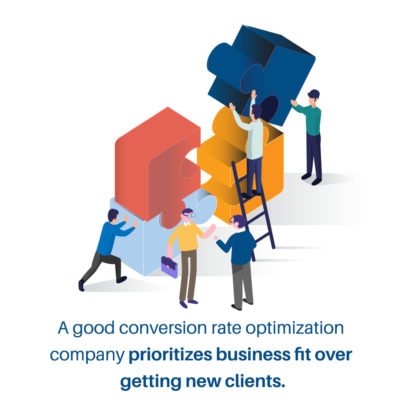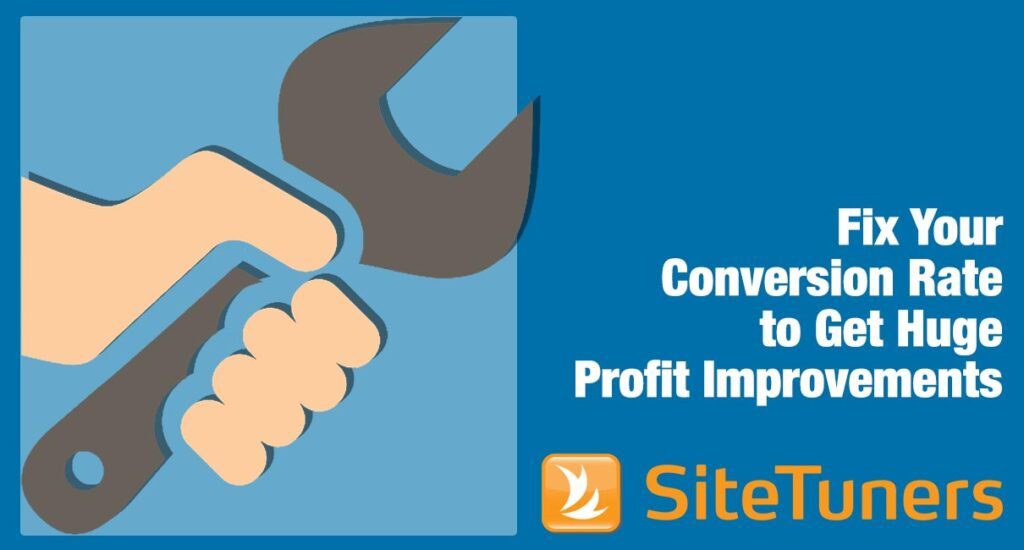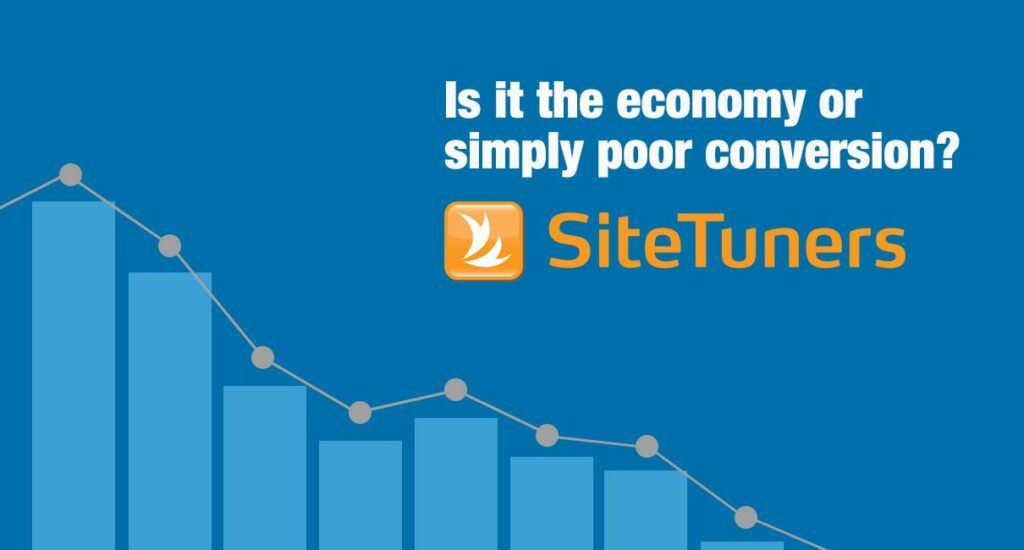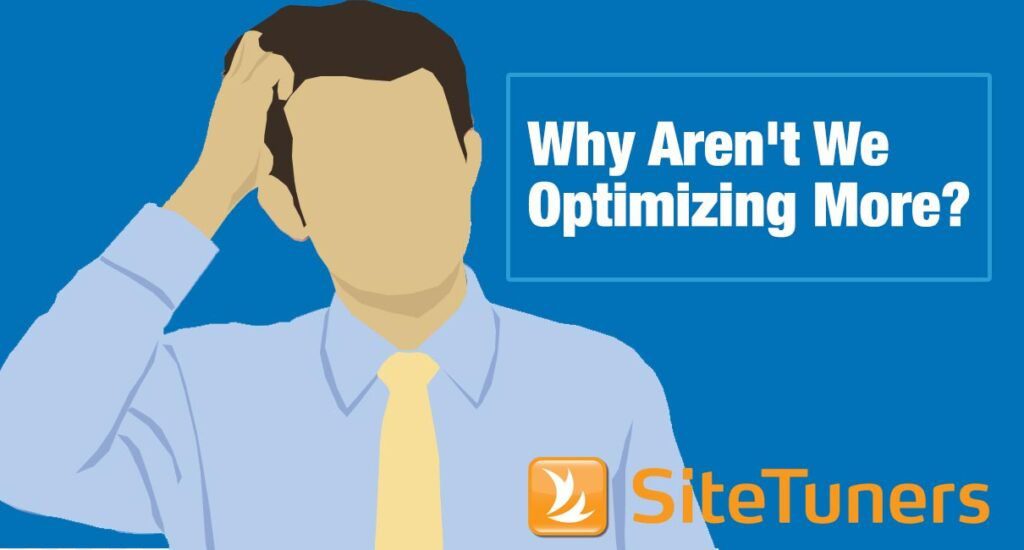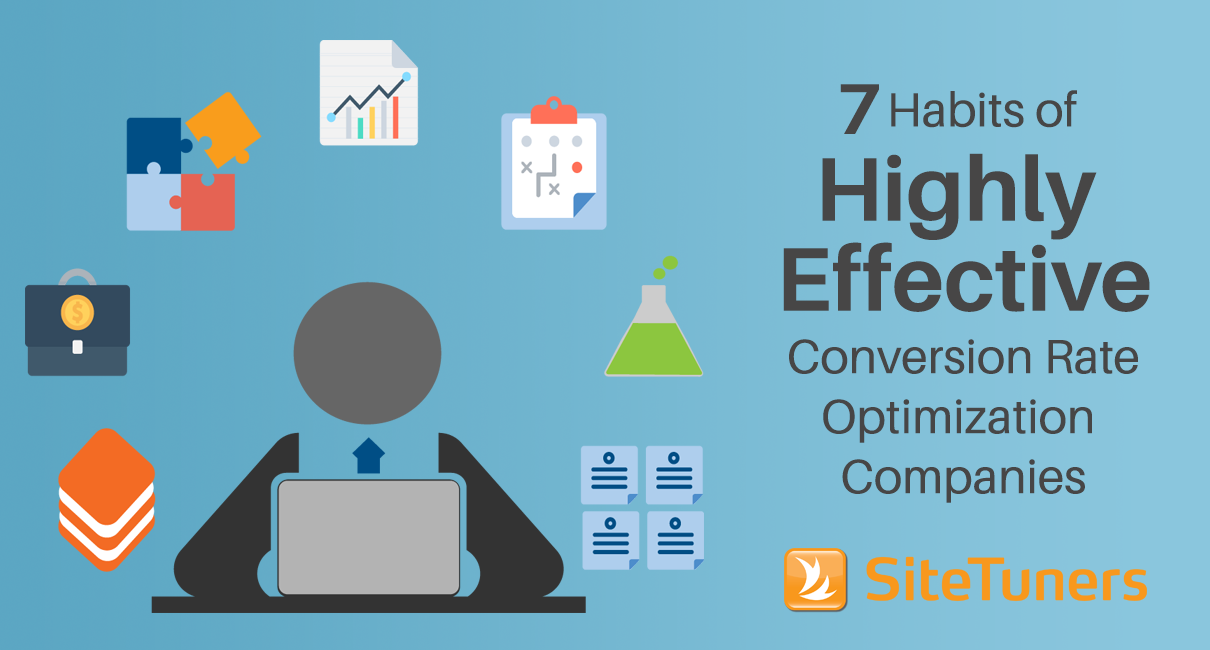
Conversion Rate Optimization Companies: The good vs. the bad
What makes this even tougher is that for a lot of organizations, good CRO agencies look identical to crappy ones.
If the reason you need help is that your analytics and testing culture is not very mature, your marketing department might not have the specialization to ask the right questions when looking for a conversion rate optimization partner. Ideally, you’d want to distinguish between …
- agencies that talk a good game and make great promises, and
- companies that can actually do great conversion work
Both types of companies will make great PowerPoint presentations. You’ll need other ways to sniff out which agencies will actually get you results.
Thankfully, there are some things that you can observe about effective conversion rate organization companies. You’ll just have to put in a little bit of work to evaluate their habits.
1. Constantly works on specialization
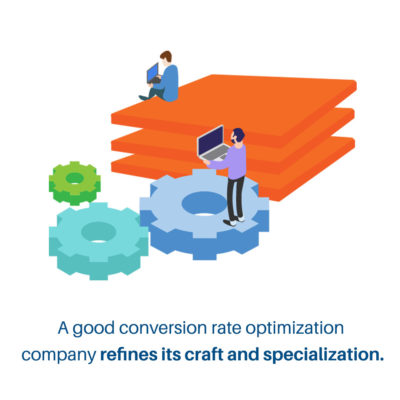
From a tools standpoint, CRO consultants will need to know how to work with …
- traffic monitoring tools like Google Analytics and WebTrends,
- survey tools like Qualtrics and Survey Monkey,
- heatmap tools like Hotjar and Clicktale,
- testing tools like Optimizely and VWO,
… and a range of other systems and environments.
From an industry knowledge standpoint, they’ll need to be familiar with …
- web analytics,
- usability testing and landing page optimization,
- split and multivariate testing,
- project management,
… and a slew of other crafts.
An agency with primarily SEO services or design services will drown trying to learn all that.
What all of this means is that good conversion rate optimization companies specialize.
They refine their testing knowledge. They hit the grindstone with their analytics skills. They are constantly working on all the crafts that are needed for conversion rate optimization.
You will tend to not see this in SEO consulting services that also happen to sell CRO. You won’t find this when working with companies whose core skills are Google Ads bid management and ad creation. You won’t see this habit in one-stop-shop online marketing companies. You won’t see this in traditional ad agencies that have developed a digital arm. And you won’t find this in design and brand management firms.
You need to find organizations that make it a habit to obsess about CRO and landing page optimization, and obsess about this field first and foremost.
2. Learns the client’s business, not just the website
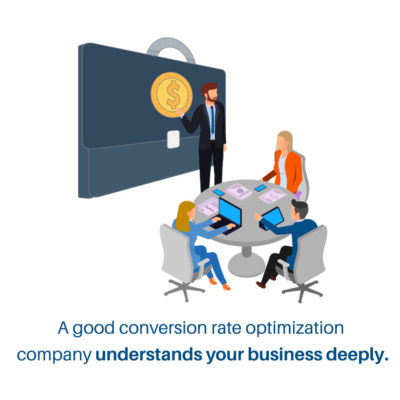
If you’re working with a good CRO services company, you should listen for these types of questions:
- How does your company make money? How does your website contribute to that?
- What does your marketing technology stack look like? What tools are available?
- Has your company ever run split tests or usability tests? What is the testing culture like?
- When changes are needed, how do you work with the IT department to launch new things?
Conversion rate optimization is very dependent on company culture. A great solution for one type of organization can be disastrous for another.
The solution that will be right for you will be a custom one.
It will involve your metrics. It will involve your goals. It will involve your business model. It will be the result of multiple conversations that don’t just delve into things you’d like to test.
So, the firm you’re going with will need to learn a lot about your company.
If all they ask you is what split testing tool you’re using and what tests you’d like to run, that should be a red flag. You’ll want to pick someone else.
3. Prioritizes compatibility over getting new clients
Great conversion rate optimization companies will want to work with your business if, and only if, your needs and the services they provide match. Competent conversion professionals prioritize business fit over getting new clients. This way, nobody’s time gets wasted.
- When you have conversion experts asking questions that closely define what it is you want to do and what your pain points are, that’s generally a good sign.
- When you have conversion professionals who ask what type of tests you want to conduct before homing in on what your goals are, that’s generally a bad sign.
- When you have conversion goals and an agency pitches tasks for that as a subset of an SEO or a design project, run away and don’t look back.
CRO Maturity
Competent conversion professionals will want to understand where your marketing organization is in terms of maturity and how you work with IT to make changes to the site.
If your team isn’t mature enough to run tests yet, part of the long-term engagement will likely be to expose them to the testing tools and methodologies, and get them trained to run tests on their own. That will take time. The first tests will definitely be run by the CRO agency, but conversion experts will understand that instilling a testing culture can be just as important as upfront results.
Another thing good conversion professionals will try to understand is how you make changes to the site, and how quickly changes can be made. If they ask questions like the ones below, they’re showing they care about finding out what’s possible specifically for your company:
- How do code changes get made on the website, and how long are your sprint or code deployment cycles?
- If new tools are needed, do you have a tag management system managed by marketing, or will new scripts need to be passed to IT?
- Can your marketing team handle changes to the page layouts, or are those IT tasks?
Find out where your company is on the CRO roadmap and how you can take CRO to the next level. |
4. Ruthlessly pursues the right data points
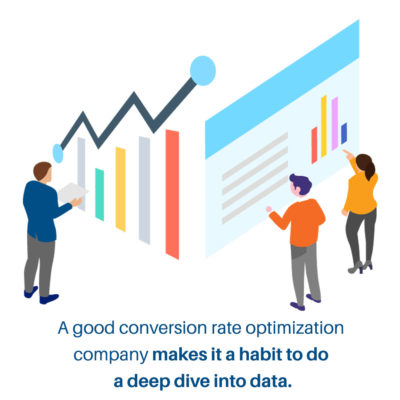
- A high bounce rate on a landing page can be indicative of a conversion problem. A professional will be able to find that on tools like Google Analytics or WebTrends.
- Clickthroughs to non-essential conversion paths can be a problem on landing pages. A conversion expert will be able to find that using heatmap software like Hotjar.
- Low success rates for a section of the website can be a source of conversion headaches. CRO professionals will be able to spot those on software like Qualtrics or Survey Monkey.
- Mismatches between your Google Ads advertisements and your landing page title and content can lead to poor conversion rates. Tool experts should spot that problem when reviewing your Google Ads presence and your content.
Before your first test with an agency gets run, whatever available data points you have should be analyzed ruthlessly by a competent professional.
This is why good conversion professionals make it a habit to do a deep dive into data.
A test guided by intuition and best practices can yield results. A test informed by multiple data points and then guided by intuition and best practices will tend to yield better results. A serious conversion professional will always prefer the latter.
5. Finds contained, measurable goals
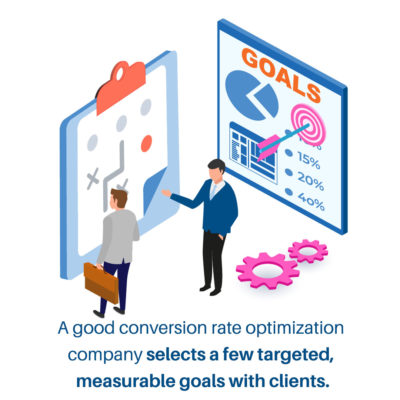
For starters, some pages will not be viable candidates for split and multivariate tests. Low traffic and low conversion pages still need to be optimized, but split testing is not the tool you’d use to improve it (the tests would take too long to complete). A winning challenger page would not be the appropriate goal.
Cart abandonment reductions will likely be more in the realm of usability testing than split testing. You’d need a redesign of the cart experience, after forming some theories about the drop-offs. Nowhere will there be a goal of having a winning challenger page.
Potential Goals
Even for areas where split testing is possible, you can have a range of potential goals:
- Reducing bounce rate
- Increasing add-to-cart clicks
- Getting visitors to select high-margin products/services from a category page
- Getting more visitors to select bundles rather than a base product
What all of this means is that you need CRO professionals who understand the many possible goals of improving conversions, and then making it a habit to select a few targeted, measurable ones with clients.
Skilled conversion rate optimization companies will take the time to understand your goals, your technology stack, and things that can impact your bottom line. Once they have that, they’ll work with you to find specific things to improve and agree with you on how success will be measured.
6. Tests a wide range of viable options
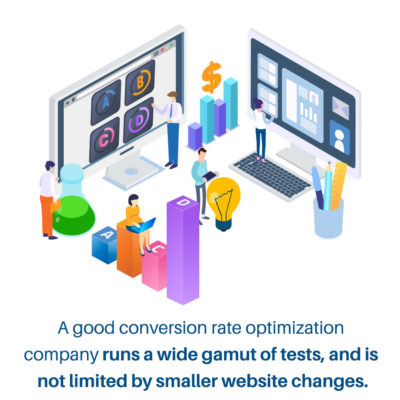
- Some webpage improvements require just a button color change. Tests can confirm which color leads to more clickthroughs, which in turn leads to more profit.
- Some page improvements are broader than that. Layout changes with button color changes and text changes can impact the clickthrough rate for landing pages.
- Some improvements are even broader than that. Some page types need a complete overhaul. Others need things like additional offers added to serve as “anchors” that get lower-priced items to convert.
Some CROs are used to the button color-type tweaks on tests, but can’t navigate their way around larger projects like page overhauls.
Good CROs hone their craft, and make it a common practice to understand exactly what kind of test you need to produce good results. Agencies that understand conversions run a wide gamut of tests, and are not limited by just having knowledge around smaller website changes.
Small tweaks and large tweaks both have situational advantages. You’ll know you’re working with qualified conversion experts when they can walk you through the reasons one of them is right for you.
7. Avoids scope creep and moving goal posts
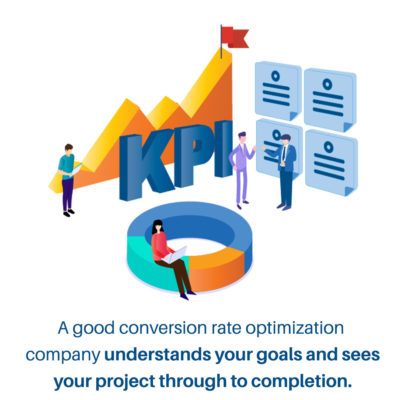
They will take as much time as needed to understand what you’re trying to achieve, and how you’ll know when that benchmark has been reached. They will outline steps to get there, and walk you through the iterative improvements and key performance indicators for each improvement.
That said, once the handshake is made, efficient conversion experts will understand that you need to see projects through to completion. If new goals get inserted into a project midstream, it might impact the set of tasks getting done. If the project expands to cover new ground, you might not be properly resourced to tackle it.
Good CROs can be flexible, but only to a point. They make it a habit to agree on a set of goals that will not change mid-project. They make it a point to define limited engagement points so that if new things come up, they can be properly scoped and resourced appropriately.
Good habits lead to good results
Selecting a conversion partner is tough work. Choosing an agency that doesn’t “fit” can lead to months or years of wasted optimization time. The problem is, for most marketing departments, the good “fit” conversion optimization companies look pretty identical to the bad “fit” ones.
This is where looking for specific habits come into play.
You need to find most of these when looking for a conversion partner:
- Highly specialized conversion knowledge (not a firm that specializes in other things with conversion as an add-on, and not one-stop shops)
- Attention paid to your specific business needs rather than a boilerplate path to conversions
- Questions that indicate they’re looking at business fit, not your company wallet
- Top tier analyst skills when analyzing your available data points
- Specificity in stating measurable goals for the engagement
- Comfort in testing a wide variety of ideas, not just small mechanical ones
- Adherence to stated goals
If you see your potential conversion rate optimization partner exhibiting those traits and habits, you’re likely to be in good hands.
